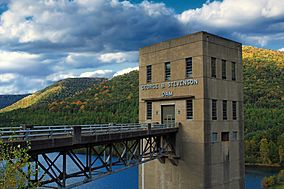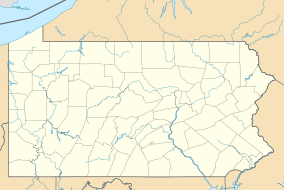Sinnemahoning State Park facts for kids
Quick facts for kids Sinnemahoning State Park |
|
|---|---|
|
IUCN Category III (Natural Monument)
|
|

A view of Sinnemahoning State Park
|
|
| Location | Pennsylvania, United States |
| Area | 1,910 acres (7.7 km2) |
| Elevation | 961 ft (293 m) |
| Established | 1962 |
| Governing body | Pennsylvania Department of Conservation and Natural Resources |
| Website | Sinnemahoning State Park |
Sinnemahoning State Park is a large park in Pennsylvania, covering about 1,910 acres. It is located in Cameron and Potter Counties. The park is surrounded by the Elk State Forest, which means it has lots of mountains and deep valleys.
This park is a special home for animals like the rarely seen elk and the majestic bald eagle. You can find Sinnemahoning State Park along Pennsylvania Route 872. It is about eight miles (13 km) north of the small village of Sinnamahoning. The park first opened in 1958 and officially became a Pennsylvania State Park in 1962.
Contents
Park History
Early People
Native Americans started living in the Sinnemahoning State Park area a very long time ago, about 10,000 to 12,000 years ago. They came after the big glaciers melted away. They found that this area had plenty of fish, wildlife, berries, and nuts to eat.
Archaeologists have found signs that these early people lived near the creeks. The name "Sinnemahoning" comes from an American Indian word that means "Rocky Lick." People say there was a natural salt lick (a place where animals go to lick salt from the ground) near the mouth of Grove Run.
The Lumber Boom
After a while, the native people of Pennsylvania had to leave because of diseases and the American Revolutionary War. The Sinnemahoning area was mostly wild and empty until the late 1800s. That's when the big logging boom started in the mountains of Pennsylvania.
Lumbermen cut down huge, old trees. They floated the logs down Sinnemahoning Creek and its smaller streams to the West Branch Susquehanna River. From there, the logs went to Williamsport. The loggers only left behind the tops of the trees. These tree tops dried out and often caught fire from sparks from passing steam locomotives.
These fires caused huge wildfires that swept through the mountains and valleys. The Sinnemahoning Creek area was left damaged. The forests struggled to grow back, the hills started to wash away, and many streams and animals disappeared.
George B. Stevenson Reservoir
The George B. Stevenson Reservoir is a man-made lake that covers about 142 acres. It was built in 1955 by the Commonwealth of Pennsylvania. The lake was designed to help control floods on the West Branch Susquehanna River.
It is one of four dams in the river system that help prevent floods in towns and cities downstream. The reservoir is named after George B. Stevenson, a former State Senator. He saw the big flood in 1936 when he was the mayor of Lock Haven. After that, he worked hard to prevent floods during his time in politics.
Fun Activities
Boating and Fishing
You can enjoy some boating on the George B. Stevenson Reservoir. However, only electric motors are allowed on boats. You can also use sailboats, rowboats, canoes, kayaks, and paddleboats. All boats must be properly registered.
The lake and streams are great for fishing. You can catch fish like brook trout, rainbow trout, brown trout, catfish, crappie, tiger muskellunge, smallmouth bass, largemouth bass, sunfish, bluegill, perch, and pickerel. Some small streams in the park even have their own native brook trout. In winter, when the lake freezes, you can go ice fishing.
Hunting
About 1,400 acres of the park's woods are open for hunting. Hunters must follow the rules set by the Pennsylvania Game Commission. Common animals hunted here include black bears, eastern gray squirrels, ruffed grouse, waterfowl, white-tailed deer, and turkeys. However, hunting groundhogs is not allowed. Hunters also use the park to get into the Elk State Forest.
Trails for Exploring
The trails at Sinnemahoning State Park are perfect for hiking, cross-country skiing, and snowmobiling.
Red Spruce Trail
This trail is about one mile (1.6 km) long. It goes from the camping area to the Forty Maples Picnic Area. You'll walk through a spruce tree farm and a forest with different kinds of hardwood trees. Be careful of venomous snakes that live in the area.
Low Lands Trail
The Low Lands Trail is a flat path that follows an old railroad track. Along this trail, you might see vernal pools (temporary ponds), thick groups of spruce trees, and creek beds. The Low Lands Trail ends at the Wildlife Viewing area. Keep an eye out for osprey, butterflies, elk, and different kinds of grassland birds.
Camping and Picnicking
The park has a modern campground with 35 campsites. There's a washhouse with showers and flush toilets. The campsites can hold tents, campers, and RVs. Each site has a picnic table and a fire ring.
You can also rent the Brooks Run Ranger cabin. It's a two-story house that sleeps up to twelve people. It has four bedrooms, a living room, a kitchen, and a fireplace. Sinnemahoning State Park also has three picnic areas where you can enjoy a meal outdoors.
Wildlife Center
The park's visitor center and office opened in 2011. It's called the Wildlife Center at Sinnemahoning and is in the northern part of the park. The building has cool exhibits that teach you about wildlife. It also gives you chances to see animals in their natural home.
Nearby State Parks
Here are some other state parks close to Sinnemahoning State Park (within 30 miles):
- Bendigo State Park (Elk County)
- Bucktail State Park Natural Area (Cameron and Clinton Counties)
- Cherry Springs State Park (Potter County)
- Denton Hill State Park (Potter County)
- Elk State Park (Elk County)
- Hyner Run State Park (Clinton County)
- Hyner View State Park (Clinton County)
- Kettle Creek State Park (Clinton County)
- Lyman Run State Park (Potter County)
- Ole Bull State Park (Potter County)
- Parker Dam State Park (Clearfield County)
- Patterson State Park (Potter County)
- Prouty Place State Park (Potter County)
- S. B. Elliott State Park (Clearfield County)
- Sizerville State Park (Cameron and Potter Counties)
Images for kids
 | Bayard Rustin |
 | Jeannette Carter |
 | Jeremiah A. Brown |



